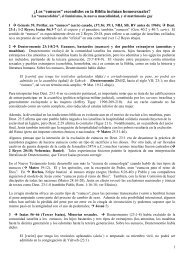Deuteronomy: - Fundación Otras Ovejas de Argentina
Deuteronomy: - Fundación Otras Ovejas de Argentina
Deuteronomy: - Fundación Otras Ovejas de Argentina
You also want an ePaper? Increase the reach of your titles
YUMPU automatically turns print PDFs into web optimized ePapers that Google loves.
that the ―name [of the <strong>de</strong>ceased brother] may not be blotted out of Israel‖ (Deut. 25:6-7,9). Although the text says<br />
nothing specifically about provision for and protection of the widow, practices and laws in other cultures make<br />
explicit the motive of also providing for the widow. Therefore, it is preferable to interpret this discourse about the<br />
preservation of the name of the <strong>de</strong>ceased as a part of the rhetoric to convince the responsible man to fulfill his<br />
responsibility, given that the prescribed rite with an insult (pull off his sandal and spit in his face) makes it clear<br />
how common it was that the brother of the <strong>de</strong>ceased did not want to fulfill his obligation. This ritual is the only act<br />
of humiliation utilized in the Bible as a penalty against an offen<strong>de</strong>r. 41 Given especially the great emphasis in<br />
<strong>Deuteronomy</strong> on the necessity of providing for widows (see above, un<strong>de</strong>r The Poor, 3.5), and the obvious concern<br />
of Tamar (Genesis 38) and of Ruth and Naomi (Ruth) for their own necessity, it is highly probable that the rea<strong>de</strong>rs<br />
un<strong>de</strong>rstood from the context of the book this obvious but only implicit motive in the <strong>Deuteronomy</strong> law (� 3.7<br />
Levirate Marriage, below; � Mark 12:18-27 // Mat. 22:23-33).<br />
However, other texts in <strong>Deuteronomy</strong> about women appear more negative than the laws in the other co<strong>de</strong>s,<br />
especially….<br />
*2.15 25:11-12 Hand cut off when a wife mutilates the genitals of a man. This law competes with the<br />
texts concerning the or<strong>de</strong>al for the woman suspected of adultery (� Numbers 5) and the sacrifice of Jephthah‘s<br />
daughter (� Judges 11:29-40), all truly ―horror texts‖ for women. 42 As Jeffrey Tigay points out, the interpretive<br />
efforts of the Talmud and medieval Jewish commentators indicate that the text has been problematic not only for<br />
mo<strong>de</strong>rn rea<strong>de</strong>rs. The punishment appears to be too severe for the offense of a woman who attempts to <strong>de</strong>fend her<br />
husband in a fight where he could have been the victim of violence. 43 With the exception of the lex talionis<br />
(perhaps always figurative for equivalent fines, � Exodus 21:22-25), the amputation of the hand is the only<br />
example of mutilation as punishment in the Bible, but it continues in force in Saudi Arabia and some other Arabic<br />
countries. 44 Commonly the law in <strong>Deuteronomy</strong> is seen as an adaptation of an Assyrian law suggesting that the<br />
woman injured the man‘s genitals. 45 The greater autonomy of the woman reflected in <strong>Deuteronomy</strong> may be seen<br />
in the fact that in this law the woman takes the inititive in a fight between two men and managed to inflict serious<br />
injury to the man who attacked her husband, while in the Exodus law the pregnant woman is passive and suffers an<br />
involuntary abortion (21:22-25). However, according to Tikva Frymer-Kensky, in the resulting law, ―A man‘s<br />
genitals—any man‘s genitals—are now sacrosanct. Women must not only follow the authority of their head of<br />
household: all men are now a privileged caste protected by the state, and their genitals, the emblem and essence of<br />
their manhood, are now sacrosanct‖‖ 46 By commanding similar mutilations for male adulterers (Mateo 5:27-30;<br />
18:8-9; Marcos 9:43-49), Jesus appears to correct the prejudice against women in Deut. 25:11-12—and by his use<br />
of hyperbole Jesus at the same time corrects the literal interpretation of <strong>Deuteronomy</strong>, which always had a<br />
―pedagogical purpose‖ rather than literal, according to Duane Christiansen. 47<br />
3. Twelve Sins / Sexual Minorities (* = the seven only in <strong>Deuteronomy</strong>). Since the Levites of the north played<br />
a principal role in the production and conservation of the book (31:9-13,24-29; 33:8-11; 17:18), not surprisingly<br />
the principal ―option for the poor‖ in <strong>Deuteronomy</strong> favors this landless priestly tribe (12:12,18-19; 18:1-2. Levites<br />
named 26 times: Deut. 10:8-9; 12:12,18-19; 14:27,29; 16:11,14; 17:9,18; 18:1,1,6,7; 21:5; 24:8; 26:11,12,13;<br />
27:9,12,14; 31:9 25; 33:8[-11]). 48 Furthermore, since many Levites were unmarried itinerant priests (� Judges<br />
17–18; 19–21; 1-2 Chronicles), not surprisingly, <strong>Deuteronomy</strong>, a product of the Levites and prophets of the north,<br />
inclu<strong>de</strong>s many texts concerning sexuality and sexual minorities. <strong>Deuteronomy</strong> <strong>de</strong>als with five sexual themes that<br />
receive attention in the other legal co<strong>de</strong>s of the Pentateuch: the practice of polygamy (accepted) and four practices<br />
con<strong>de</strong>mned as crimes—adultery, seduction of virgens, bestiality and incestuous relationships. The first three<br />
crimes had already been con<strong>de</strong>mned in Exodus, and the last was con<strong>de</strong>mned in the Holiness Co<strong>de</strong> in Leviticus.<br />
1 Polygamy, � 1-2 Chronicles, 1-2 Kings:<br />
o Instruction to the kings, *Deut. 17:17;<br />
o First-born, unloved mother, *Deut. 22:15-17 (cf. Gen. 25:29-34);<br />
2 Adultery, Deut. 22:22; 5:18; � Ex. 20:14;<br />
15

















